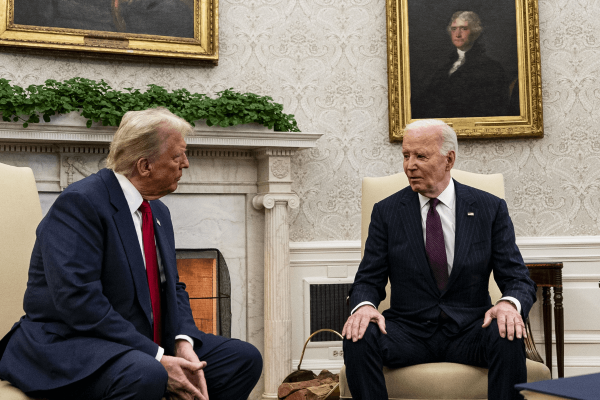Editors note: This is part four of an eight-part series exploring the eight Jesus questions all of us must face, highlighted in Jim Wallis's new book Christ in Crisis: Why We Need to Reclaim Jesus (HarperOne), available now. These next eight weeks will help us go deeper than the headlines, to find our way back to Jesus in the midst of this intensive and exhausting news cycle.
Want to hear this in an audio format instead? We just launched an eight-episode podcast series called Reclaiming Jesus Now that features Allison Trowbridge and William Matthews speaking with Jim Wallis about these questions and their relevance today.
How is power wielded in the world today, and what does leadership look like? If we’re following Jesus, what should it look like?
It feels like, over the last month, hardly a day has gone by without a new revelation of corruption and abuse of power by President Donald Trump. Whether it is the increasingly-clear quid pro quo in which military aid to Ukraine was conditioned on the Ukrainian president announcing an investigation to damage one of Trump’s political rivals, or the now-abandoned plan to host world leaders at Trump’s Florida golf club at taxpayer expense, we see a leader so obsessed with power and himself that he gives no thought to warping the foreign policy of the United States and the use of taxpayer dollars to serve his personal finances and political fortunes. But what did Jesus teach about leadership and power?
Jesus’ disciples were arguing one evening about which of them was the greatest among them. Jesus patiently explained to them that they had to turn their entire notion of greatness, power, and leadership on its head:
“The kings of the Gentiles lord it over them; and those in authority over them are called benefactors. But not so with you; rather the greatest among you must become like the youngest, and the leader like one who serves. For who is greater, the one who is at the table or the one who serves? Is it not the one at the table? But I am among you as one who serves” (Luke 22:25–27).
The contrast could not be greater between the way of “the kings of the Gentiles” (meaning the way of the world) and the way of Jesus. What does it mean to be the greatest as one who serves? I think this deep contrast to the way of the world is actually the foundation for our idea of public service.
So how do we understand leadership when it's being put forward as only winning and losing, when a leader is the one who's the biggest and the best and the richest and the most powerful?
Jesus demonstrates the archetype for his way of servant leadership by washing their feet, an act of deep humility and service. Servant leadership often manifests itself in how members of a community support and serve and love each other and hold their communities together. In our conversation for this week’s podcast episode of Reclaiming Jesus Now on the “Power Question,” William Matthews gave a moving example of what that can look like, based on this biblical account of foot-washing. Matthews grew up in a church that practiced foot washing and recalled how strange he thought it was as a kid but then began to understand the importance of this act.
“…what I realized what was so powerful about it, even for me as a little boy, was [that] I wasn't simply washing their feet. They would come and wash my feet. And I remember as a little boy that registering with me … recognizing that not only was I called to serve these men, but they were also called to serve me … knowing that this community loved me and accepted me and would fight to protect me was deeply reassuring.”
Matthews also talked about what foot washing taught him about himself and his dignity.
“That’s where I truthfully got my sense of dignity and worth and value, was to be supported by this group of black men who loved me and my little body and said, ‘You’re okay just the way you are."
What a contrast William’s experience as a young boy is to what so many children in our country today are internalizing from the current leadership in Washington, D.C. Presidents and other leaders are role models for young people. A lot of young people want to be leaders, so when a national leader like Donald Trump acts as though leadership is about who is the best, the biggest, the richest, the most powerful, it’s only to be expected that young people will see that and seek to emulate it.
Unlike Donald Trump’s immoral leadership style, one of our best contemporary examples of public service and servant leadership from a U.S. politician is Elijah Cummings. He embodied selfless service to his constituents alongside a deep commitment to both love and justice. He lived out the values that we must now protect in our all too fragile democracy. Gone far too soon at the age of 68, Rep. Cummings demonstrated servant leadership over the course of his whole life and career.
At age 11, he helped integrate a local swimming pool, braving whites throwing bottles and rocks at him to do so. After Freddie Gray died in police custody in 2015, Rep. Cummings marched through the uprising in West Baltimore arm in arm with a dozen other residents, singing “This Little Light of Mine” in order to bring calm to an understandably volatile situation.
He physically interposed himself between protestors and police, bullhorn in hand, for several straight nights because of his deep love for, and service to, his community.
It’s fitting that, as Chair of the House Oversight Committee, he is one of the people Donald Trump felt most threatened by, because Rep. Cummings’ way of leadership could not be more different from Donald Trump’s. Rep. Cummings’ relationship with Jesus led him to want to serve the public, while Donald Trump seems to want the public to serve him.
Around the world, there are leaders of other countries who embody true public service. New Zealand Prime Minister Jacinda Ardern led her nation with empathy and resolve in the wake of the massacre of 50 worshippers at a mosque, swiftly passing an assault weapons ban.
Earlier this month Ethiopian Prime Minister Abiy Ahmed was awarded the Nobel Peace Prize for his efforts to end a two-decades-old border war with Eritrea.
And yet, despite these positive global examples, our situation in the United States is not unique. There are autocratic would-be strong men all over the world. They're rising, and none of them are known to practice servant leadership. They’re known as corrupt. They’re known as unprincipled. They’re known as perpetual liars. They’re known as people who are serving themselves, people who are serving their own wealth and power, but not serving those around them. And while we are in a time where this authoritarian style is on the rise, it’s as old as humanity itself.
In our discussion, Allison Trowbridge made an important point that speaks to the theological reasons why democracy is so important:
“C.S. Lewis is talking about this idea of democracy and says that ‘a great deal of democratic enthusiasm descends from the ideas of people like Rousseau who believed in democracy because they thought mankind so wise and good that everyone deserved to share in the government,’ and he goes on to say that ‘the real reason for democracy is just the reverse. Mankind is so fallen that no man can be trusted with unchecked power over his fellows.’ I think we get this false sense of believing that democracy is because we’re all so good, we all ought to be contributing and sharing, and instead it’s about not allowing power to go unchecked.”
The question of whether and how to check power is deeper than politics. Are checks and balances just our political preference or our political philosophy, or is it rather theological? Reinhold Niebuhr, American public theologian, put it perfectly when he said “[humankind’s] capacity for justice makes democracy possible, [humankind’s] inclination to injustice makes democracy necessary.”
This is checks and balances. This is a theological necessity, not merely a political preference. Absolute power does indeed corrupt absolutely. The point of a democratic system is to try and make sure that doesn't happen.
In this moment of political crisis in the United States, our more-than-two-century-old commitment to checks on absolute power is being tested. We already have a president who has marginalized the Congress. He has refused subpoenas and refused to provide requested documents. When the Supreme Court decided against him on adding a citizenship question to next year’s census, he threatened to defy the court. He backed off at the last minute, but in my view, if he wins a second term, Donald Trump would defy the courts, rejecting any checks and balances to his power. So what this next election is, apart from any of the policy questions on which we can disagree, is a referendum on democracy itself. A referendum on whether checks and balances will be resilient or whether we will lose all of our checks and balances to executive power. That’s what’s at stake. How can we prevent tyranny? How can we demand service? That has to become a theological issue for Christians in 2020.
Got something to say about what you're reading? We value your feedback!







